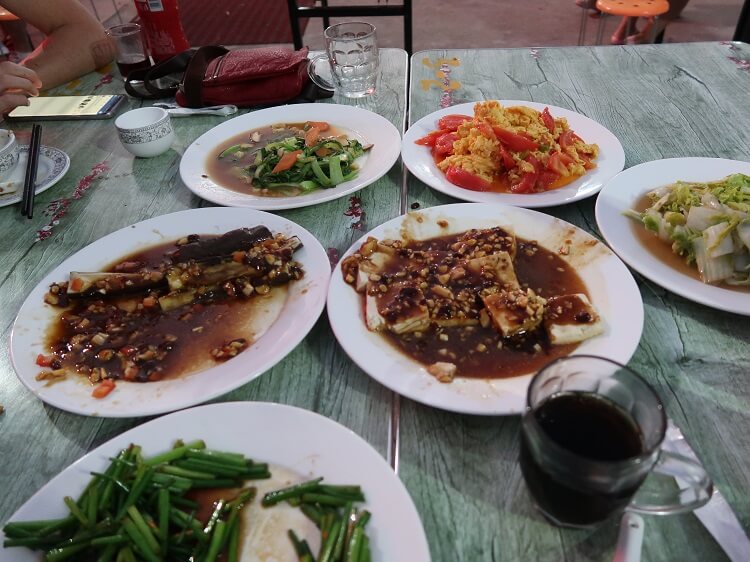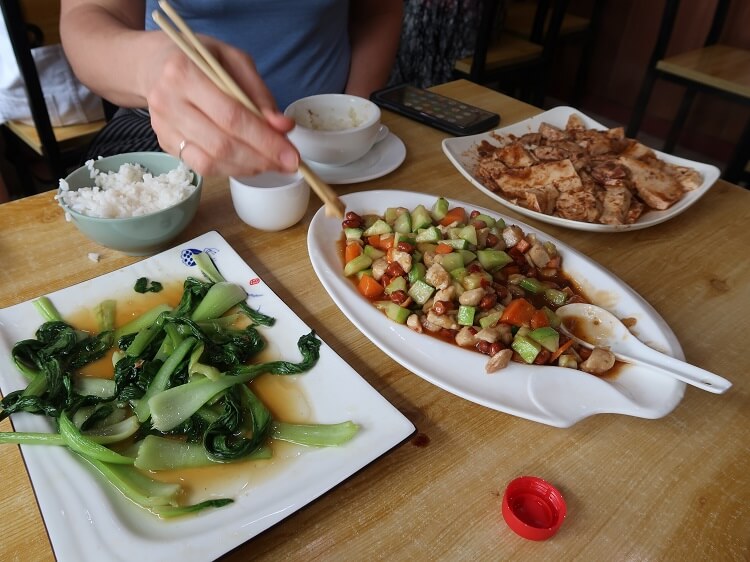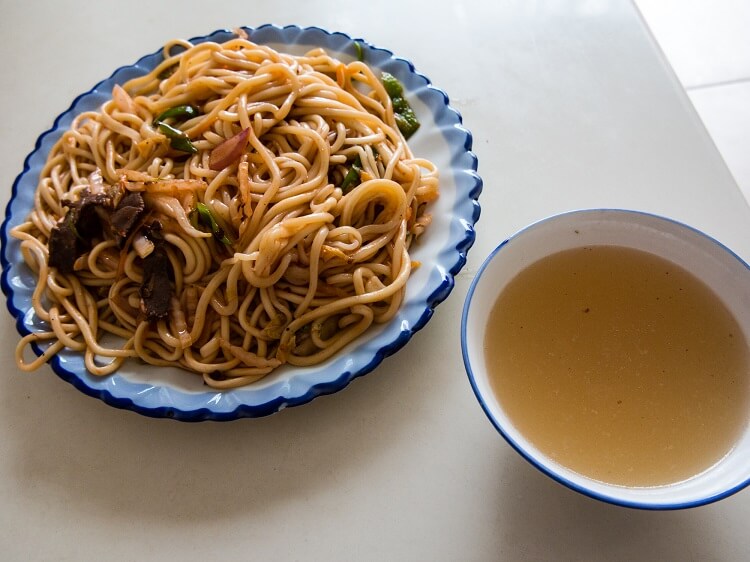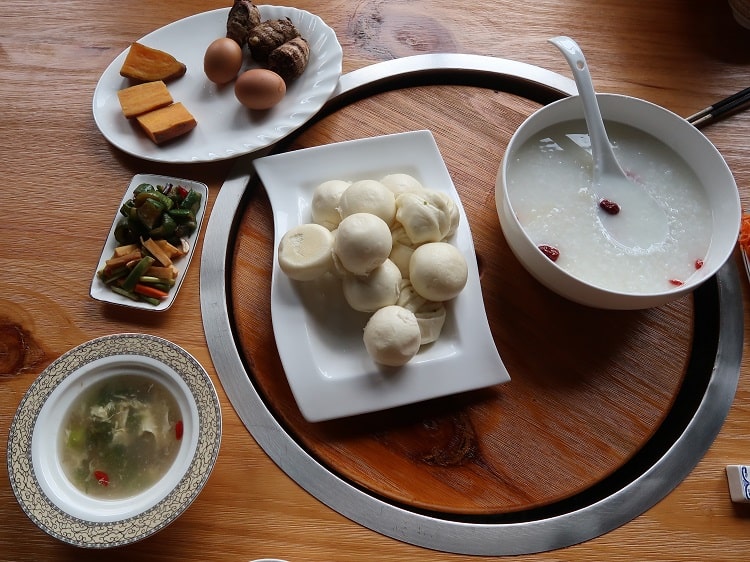Being a vegetarian in China can be difficult, there’s no way to sugar-coat it.
That’s a real problem if you avoid meat because of your health, the animal cruelty factor or the environmental impact.
But the good news is you don’t have to avoid traveling to China completely.
It is possible to survive if you don’t eat meat or even if you’re vegan in China. You just need to be careful and a little bit creative.
In this blog, I’ll share eight tips to help you remain a vegetarian in China.
But first, what does vegetarianism mean in China?
The biggest barrier between you and delicious vegetarian meals is how the locals think about vegetarianism.
Not many people choose to be vegetarian in China. There are estimates that under 4% of the population go meat-free.
Traditionally speaking, being able to afford eating lots of meat is a sign of wealth. And in China, wealth is a very important status symbol.

There aren’t many vegetarians in China. Image supplied by Mike Cairnduff.
Those who do identify as vegetarians are usually part of the Buddhist faith. This has a long history in China despite its increasing secularism.
However, Chinese people who follow this faith usually eat seafood and think of it as vegetarian.
This is just one of the many cultural differences that will make eating a plant-based diet in China a bit of a challenge.
Because there aren’t many vegetarians in China, you’ll probably struggle to get your needs understood. Even if waitresses and chefs understand that you don’t want meat in your meal, they may still serve you food cooked in meat-based broth.
It will take a lot of patience and some mistakes before you make your needs understood. Just stay calm and keep trying, despite the language barrier.
OK, now for my tips!
1. Look for monastery-run and Muslim restaurants
Monastery-run restaurants in China can be a great place to get delicious vegetarian meals.
They serve some of the best vegetarian dishes in the country and you can be fairly certain they’re meat-free at the very least.
You should also give Muslim restaurants a go.

Tasty eggplant and bok choy dish. Image supplied by Mike Cairnduff.
Although Muslims eat meat, they seem to have a better understanding of strict food preferences than the general population in China. There are usually some good vegetarian options at Muslim restaurants across the country.
If you see the Chinese characters 清真 at the top of the menu or outside the restaurant, you’ll know you’re in the right place.
2. Go on a vegetarian food tour
You really should think about going on a vegetarian food tour, especially if you have zero knowledge of Mandarin.
You’ll find vegetarian food tours (like these ones from EasyTourChina) in all the popular tourist cities. So you might as well take advantage of them.

Vegetarian food tours are increasingly popular. Image supplied by Mike Cairnduff.
Doing a vegetarian food tour in China will not only mean you get to eat some amazing food, but teach you some of the tips and tricks for getting by as a vegetarian in the country.
3. Learn two key phrases
There are two phrases you’ll need to know when you’re a vegetarian in China.
Learn them, write them down, and practice their pronunciation, because the tones make all the difference in the meaning. The phrases are:
- I’m vegetarian: Wǒ chī sù (我吃素)
- I don’t eat meat: Wǒ bù chī ròu (我不吃肉)
You can practice these terms using this great video on vegetarian terms.
https://www.youtube.com/watch?v=K-Igyw53mqU&feature=youtu.be
Another phrase you could use to communicate your food needs in China is:
- I cannot eat <food name>: Wǒ bù néng chī… (我不能吃…)
Using an app like Google Translate, simply insert the thing you can’t eat, e.g. fish, milk, eggs, etc.
The Chinese language is notoriously difficult for foreigners to master because of the tones. If you get one of the tones wrong, it can change the entire meaning.

Use a translation app to help get the right food on the plate. Image supplied by Mike Cairnduff.
So, keep you favorite food sentences handy on your phone, or have Google Translate ready to go at all times.
(Note: if you want to access major foreign websites and apps like Google while using Wi-Fi in China, you’ll need a virtual private network or VPN on your phone. Here’s a helpful review of the best VPNs for China.)
4. Be flexible if you can
This is probably the easiest idea for surviving in China as a vegetarian. But I know it won’t suit everyone.
Even if your meal doesn’t contain meat, you’ll often find that the broth or sauce is meat based.
There are also several vegetarian dishes that are cooked in lard, an animal-based fat, and that’s before you worry about the sauces in the dish.
This just proves that you really can’t win sometimes.

Try to be flexible in China (the second dish is meat). Image supplied by Mike Cairnduff.
The easiest way around this issue is to do your best. Try to choose a vegetarian option, talk to the wait staff about what you want, but be prepared for failure.
If you can stand it, try eating around the meat and hope for better results next time.
5. Make a vegetarian cheat sheet
The internet is good for more than booking flights to China. You can also use it to create a vegetarian cheat sheet.
Look for common Chinese dishes that don’t contain meat and then write down their names as well as the Chinese characters.
Then, when you’re in restaurants, all you have to do is scan the menu for these safe favorites.

A cheat sheet can help (pictured: tofu soup). Image supplied by Mike Cairnduff.
Here are some of the most common vegetarian dishes you’ll find across China:
- Fried egg and tomato (Xīhóngshì chǎodàn 西红柿炒蛋)
- Cold cucumber and garlic salad (Pāi huángguā 拍黄瓜)
- Sautéed cabbage with mushrooms (Xiānggū yóucài 香菇油菜)
- Vegetable fried rice (Shūcài chǎofàn 蔬菜炒饭)
- Tofu soup (Dòufu tāng 豆腐汤).
And just one more little tip for this. You’ll probably find your own favorite vegetarian dishes during your time in China.
Make sure you add their names to your list so you can look for them again!
6. Double-check your meals for meat
Just imagine that you’re in a local restaurant, everything smells great, and the waitress smiles, nods, and suggests a dish when you say you’re vegetarian.
She brings you a bowl of something that smells great. And then you bite down into one of the soft dumplings, and taste meat.
This is a common occurrence when you’re traveling as a vegetarian in China.

Is that a piece of mushroom or beef? Image supplied by Christian Wilmsen.
Either the waitress didn’t understand and didn’t want to say, or her idea of vegetarianism is vastly different to yours.
Unfortunately, this means you should always check your meals before you bite. Unless you can eat it, order something else.
7. Cook your own meals
Obviously, the best way to ensure you’re eating vegetarian food is to cook your own meals.
This will work if you’re staying in an apartment, a hotel with a small kitchenette, or if you’re living in your own apartment in China.
But even if you don’t have access to a kitchen, this idea can still work. You just need to be a little liberal with the meaning of ‘cook’.
Try exploring the supermarkets looking for snacks that can be put together into full meals.
You’ll find a huge range of snack foods in Chinese supermarkets that range from packets of nuts to a wide array of dried fruit to flavored rice crackers.

Sometimes you’ll have to rely on snack food in China. Image supplied by Mike Cairnduff.
And, make sure you’re always carrying around a packet of snacks just in case you have trouble finding vegetarian food.
8. Use technology
Make things easy for yourself and use technology when you’re in China to find restaurants that focus on vegetarian food.
They may not be as prolific as other types of restaurants, but they are out there.
Try apps like HappyCow to find vegetarian and vegan options in specific cities. You can even do searches for specific price points too.
(You should also check out these China travel apps to help you have the best trip possible.)
It might be a bit of a hike to the nearest specialist vegetarian restaurant, especially in the smaller cities, so doing this for every meal might be a bit of a pain.
But at least you have the option.
Just go!
Don’t let your fears or worries stop you from enjoying the huge, maddening and incredible country that is China.
And don’t stress about whether you’ll starve to death as a vegetarian in China. You won’t.
The truth is that it will be a challenge. But it will also be worth it.

A vegetarian breakfast at a Chinese hotel. Image supplied by Mike Cairnduff.
You may make mistakes and find yourself eating meals that taste uncomfortably of meat, but next time will be better.
Just remember that it’s the mistakes and frustrating days that often make the best stories when you get back home.
Being a vegetarian in China can be hard, but I hope I’ve allayed some of your fears. I’ve also written an article on some of the worst foods in China. Read it so you know what to avoid!
Main image credit: Supplied by Mike Cairnduff.




















